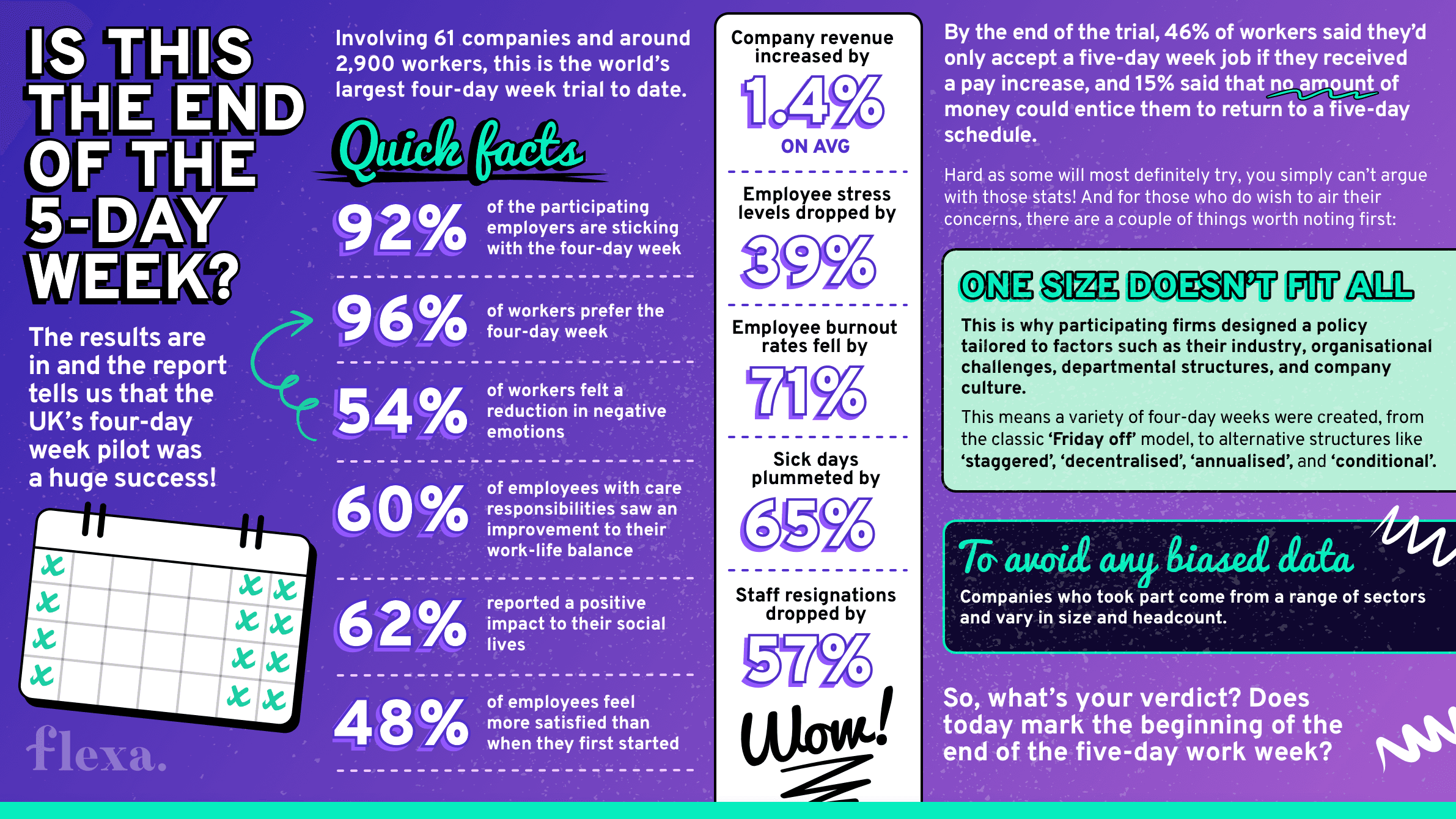Benefits Of The 4-Day Week
In a world where the lines between work and life blur more than ever, the traditional 9-to-5 grind is being reimagined. Enter the 4-day week – a revolutionary concept that's shaking up the way we approach work.
5th Jun 2024

Gone are the days of counting down the hours until Friday. With a 4-day week, employees are reclaiming their time and redefining what it means to have a fulfilling career. But it's not just about having an extra day off; it's about maximising productivity, prioritising wellbeing, and creating a healthier work-life balance.
In this blog, we'll cover 👇
- What is a 4-day week?
- When was the 4-day week introduced?
- 4 benefits of working a 4-day week
- 6 companies offering 4-day weeks in 2024
- How to find 4-day week companies to work for
What is a 4-day week?
The 4-day week is simple yet transformative. Instead of the traditional 5-day schedule, employees work for 4 consecutive days, maintaining their standard daily hours. This setup doesn't involve compressed hours or reduced pay, making it an attractive option for employers and employees alike seeking a better work-life balance.
When was the 4-day week introduced?
One of the world’s largest 4-day week trials to date, involving 61 companies and around 2,900 workers, took place in the UK from June to December 2022. The trial involved employees working 4 days as opposed to 5 with working hours reduced by approximately 6-7 hours, leading to a 32-hour week. The trial was a huge success, with 92% of participating employers sticking with the 4-day week. Here are a few takeaways worth noting:
- Company revenue rose by 1.4% on average
- 96% of workers preferred the 4-day week
- Employee stress levels dropped by 39%
- Employee burnout rates fell by 71%
- 54% of workers felt a reduction in negative emotions
- 60% of employees with caring responsibilities saw an improvement in their work-life balance, and 62% reported a positive impact on their social lives
- 48% of employees felt more satisfied than when they first started
- Sick days plummeted by 65%
- Staff resignations dropped by 57%

4 benefits of a 4-day week
A 4-day week is more than just an extra day to binge-watch your favourite shows or catch up on sleep (although those are pretty great perks too!). Check out these additional benefits and find out how it can positively impact your life.
- Improved work-life balance: With an extra day off each week, you have more time to do the things you love, spend time with loved ones, and recharge. All of this leads to increased job satisfaction and reduced burnout.
- Increased productivity: It may be hard to believe, but studies show that a shorter working week can boost productivity. How, you may ask? Employees find themselves motivated to complete tasks efficiently to enjoy more leisure time.
- Attracting top talent: Offering a 4-day week can be a game-changer when it comes to attracting and retaining top talent. With job seekers looking for more flexible ways of working, companies can become an employer of choice by offering this work arrangement and really stand out from the crowd.
- Environmental benefits: A 4-day week isn't just good for your mental health – it's good for Mother Earth, too. So, if you've ever wanted to do your part for the environment without sacrificing your paycheck, this is your chance to make a difference – one day off at a time.
6 companies with 4-day weeks in 2024
If you’re looking for companies that offer a 4-day week, look no further. Here are some of our Flexified companies leading the way.
- People & Transformational HR:This company delivers innovative and transformational work solutions and HR, Organisation Design and learning products for their clients.
- Collins Property Recruitment: The company was founded in 2014 and now has a hard-earned reputation as the go-to recruiter for the property sector.
- Friday Pulse:An employee engagement platform that helps organisations measure and improve team happiness and culture.
- Atom Bank:The company was founded in 2014 as the UK’s first app-based bank, and was the country’s first digital only bank to be granted a regulatory licence.
- Welcome To The Jungle: This company curates job opportunities so people can find more sustainable career paths.
- Simprints:A nonprofit tech company on a mission to improve the lives of the world’s poorest and most vulnerable citizens.
How do you find companies offering 4-day weeks?
Finding a company offering a 4-day week is simple with Flexa! Our platform offers comprehensive search filters to help you discover the perfect flexible role and explore potential employers. We've simplified the process into these simple steps to kickstart your search:
1. Start by creating a Flexa profile to stay updated on all available 4-day week jobs, and even get recommendations straight to your inbox!
2. Explore our 4-day week jobs page or 4-day week companies to see which companies are currently hiring. You can also check out their company pages and live feeds to get a glimpse of their work environment; and if they’re not currently hiring. you can follow them to receive notifications when they are.
3. When you find a role you're interested in, simply click on it to read the full job description and hit 'apply now' when you're ready to submit your application.
4. If you're not ready to apply just yet, you can save the job to your profile for later.